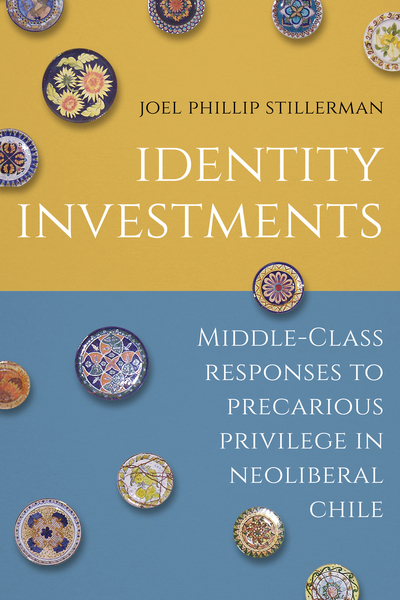
February 2023
304 pages.
from $32.00
Hardcover ISBN: 9781503634398
Paperback ISBN: 9781503634404
After Pinochet's dictatorship ended in Chile in 1990, the country experienced a rapid decline in poverty along with a quickly growing economy. As a result, Chile's middle class expanded dramatically, echoing trends seen across the Global South as neoliberalism took firm hold in the 1990s and the early 2000s. Identity Investments examines the politics and consumption practices of this vast and varied fraction of the Chilean population, seeking to better understand their value systems and the histories that informed them.
Using participant observation, interviews, and photographs, Joel Stillerman develops a unique typology of the middle class, made up of activists, moderate Catholics, pragmatists, and youngsters. This typology allows him to unearth the cultural, political, and religious roots of middle-class market practices in contrast with other studies focused on social mobility and exclusionary practices. The resultant contrast in backgrounds, experiences, and perspectives of these four groups animates this book and extends an emerging body of scholarship focused on the connections between middle-class market choices and politics in the Global South, with important implications for Chile's recent explosive political changes.
About the author
Joel Phillip Stillerman is Professor of Sociology at Grand Valley State University. He is the author of The Sociology of Consumption: A Global Approach (2015).
"This long-awaited and important book blends first-rate scholarship with oral history interviews and photos in an innovative way. Stillerman is a leader in his field and this book shows why. A must-read for Chile scholars."
—Peter Winn, Tufts University
"Using the innovative concept of identity investments as a unifying thread, Stillerman shows how distinct fractions of the contemporary Chilean middle class manage to retain commitments to guiding activist, religious, and moral visions. A must-read for scholars interested in culture, consumption, education, urban, and social movement studies."
—Omar Lizardo, University of California, Los Angeles
"[Identity Investments], which reveals the identity investments of the middle class through its thick description, is not only valuable as a study of the middle class but also as a study that sheds light on Chile's recent sociopolitical transformations. It also provides a detailed picture of the middle-class reality from the past to the present and gives important insights for addressing the political, social, and economic challenges associated with the middle class's increasing vulnerability."
—Kota Miura, The Developing Economies
"Joel Stillerman provides an intricate and refined depiction of the contemporary middle classes in Chile.... In sum, anyone interested in Chilean society, middle classes in general, qualitative sociology, or conceptual innovations derived from Bourdieu will surely enjoy this wonderful book."
—Nicolás M. Somma, Social Forces
"Overall, this well-researched, engaging book helps readers understand the transformation of Chilean society over the last 50 years, the consequences of the erosion of traditional middle-class jobs, and families' strategies to adapt to these changes and maintain their identities and cultures."
—A. Vergara, CHOICE
"Stillerman's well-documented book addresses the plural and relational nature of the middle classes as an object of study and tackles the pertinence of space as place-meaning-making in the construction of a sense of belonging and social identity. Thus, it constitutes an immense contribution to the current state of the art of contemporary sociological studies of the middle classes in Chile and abroad that also speaks to historical studies of the middle classes."
—Claudia Stern, Hispanic American Historical Review